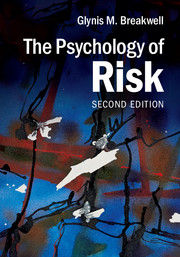Book contents
- Frontmatter
- Dedication
- Contents
- List of figures
- List of boxes
- Preface to the second edition
- Acknowledgements
- 1 A social psychological framework for analysing risk
- 2 Hazard perception
- 3 Individual and group differences in risk perception
- 4 Decision-making about risks
- 5 Risk and emotion
- 6 Risk communication
- 7 Errors and accidents; emergencies and disasters
- 8 Risk management; risk in complex systems
- 9 Social amplification, social representations and identity processes
- 10 Changing risk reactions: lessons from the psychology of risk
- References
- Index
2 - Hazard perception
Published online by Cambridge University Press: 05 October 2014
- Frontmatter
- Dedication
- Contents
- List of figures
- List of boxes
- Preface to the second edition
- Acknowledgements
- 1 A social psychological framework for analysing risk
- 2 Hazard perception
- 3 Individual and group differences in risk perception
- 4 Decision-making about risks
- 5 Risk and emotion
- 6 Risk communication
- 7 Errors and accidents; emergencies and disasters
- 8 Risk management; risk in complex systems
- 9 Social amplification, social representations and identity processes
- 10 Changing risk reactions: lessons from the psychology of risk
- References
- Index
Summary
Chapter preview
In Chapter 2 the distinction that can be drawn between risk assessment and risk perception is described, and the reasons why both should be understood are considered. In risk assessment, the relationship between risk estimation and risk evaluation is examined. The principles that underlie techniques for risk assessment are outlined and the way they are used in relation to different sorts of hazards are illustrated. It is emphasised that good risk assessment is dependent upon having good information about the hazard, its potential impacts, and the measures that could be used to control both the hazard and its effects. The chapter describes how risk can be expressed (for example, in terms of various measures of fatality, in terms of frequency of occurrence and in terms of tolerability). Issues in the quantification of risk and the nature of uncertainty are considered. The psychometric paradigm for the analysis of risk perception is presented and the dimensions along which risks can be characterised are outlined. Research on the tolerability and acceptability of risk is described. The difficulties of comparing risks are explored in the context of methods used to determine the appropriateness of different regimes for allocating limited resources to remediate the hazards (including ‘willingness to pay’ and ‘risk laddering’). The concept of synergistic risks is presented. The various criticisms of the psychometric paradigm are summarised and the counterarguments presented.
Distinguishing between risk assessment and risk perception
Complexities emerge when asking people to adopt a shared definition of risk, because in relation to many of the most important hazards there is great uncertainty about how risk can be assessed (the appropriateness and reliability of methods) and how it might be recorded (the language of risk, the measurements of risk). Risk assessment is something that we all do, a lot of the time. When we turn right on to a major road, as the driver of the vehicle we are assessing the risk of another car hitting ours before we join the stream of traffic. When we consider whether to go out on an autumn day without an umbrella, we are assessing the risk of rain. Everyday choices have risk assessment associated with them. It may not be something we do in a self-reflective manner. We may not be aware that we are doing it.
- Type
- Chapter
- Information
- The Psychology of Risk , pp. 20 - 51Publisher: Cambridge University PressPrint publication year: 2014



